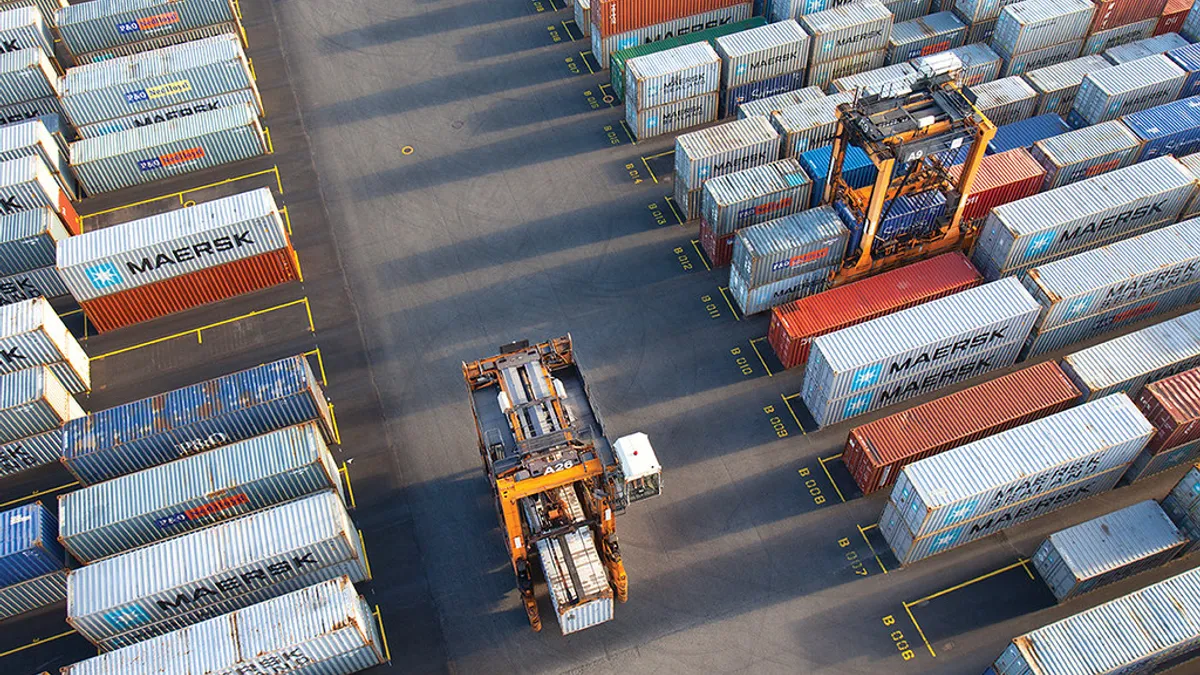Dive Brief:
- The Digital Container Shipping Association (DCSA), a consortium of nine of the 11 largest ocean carriers, has published standards for exchanging operational vessel schedules (OVS), the Interface Standard for OVS 1.0, according to a press release from the group.
- The publication of standards is meant to allow ship schedules to be shared automatically with partners who subscribe to a particular carrier's information. Guidance for implementing the standards can be found here.
- "Once implemented, our OVS standards will, for example, enable a port operator to [optimize] their operational activities in accordance with the exact arrival time and departure date of a vessel," DCSA CEO Thomas Bagge said in a statement.
Dive Insight:
In its glossary of terms, DCSA defines "vessel schedule" as "the timetable of departure and arrival times for each port call on the rotation of the vessel in question." The standards outlined by DCSA mean that Vessel Sharing Agreement partners and operational service providers can share schedule information in a common language and thus simplify the process, requiring less interpretation.
"Agreement on standards will ensure that the interfaces, including the functionality and data provided via the interfaces, will follow the same definitions and design," DCSA said in explaining the project's objective. "The aim is to ensure that the end-user experience remains consistent across all industry participants who use these standards."
The Interface Standard for OVS 1.0 is technology agnostic and can be implemented in a manual process or with an electronic data exchange, graphical user interface or application programming interface.
The documentation suggests that changes to vessel schedules should be shared in real-time and provide guidance for updating trips that have been blanked. It also says there can be three versions of a schedule: planned, estimated and actual.
The DCSA member carriers agreed on a minimum set of 12 variables that would be included in the vessel schedules.
Agreed upon variables in a vessel schedule
| Vessel schedule element | Element definition |
|---|---|
| Vessel Name | The name of the vessel given by the vessel operator. |
| Vessel IMO Number | The unique reference for a registered vessel. The reference is the International Maritime Organization (IMO) number, also sometimes known as the Lloyd's register code. |
| Voyage Number | The identifier of the voyage. The identifier is vessel operator specific. |
| Vessel Operator | The name of the company operating the vessel. |
| Location Code | Location code identifies a location in the sense of a city, town, or village, being the smaller administrative area existing as defined by the competent national authority in each country. Location Code is a 3-character code e.g. ANR for Antwerp. |
| Port Terminal Code | The identifier of the locational context of the vessel, which is being reported on, at a terminal level. |
| Pilot station arrival | The date and time of arrival at pilot station. |
| Arrival Berthed | The date and time of arrival at berth and first line ashore. |
| Departure Time | The date and time of departure and the last mooring has been released (vessel). |
| Generated Schedule Time | The date and time at which the latest version of the vessel schedule was published. |
| Vessel Schedule Change Remark | Explanation of the reason behind the schedule change. The change remark should only be communicated when sending a new version of a schedule and not for the first publication. |
SOURCE: DCSA
The DCSA was formed in 2019, after approval from the Federal Maritime Commission, with the goal of creating digital standards for the shipping industry. Earlier this year it released track and trace standards to allow shipments to be tracked between carriers.
"Our mission is to be the de facto standards body for the industry, setting the technological foundation for interoperable IT solutions," DCSA explains in its GitHub documentation for the latest standards. "Together with our member carriers, DCSA creates vendor-neutral, technology-agnostic standards for IT and non-competitive business practices."
The addition of the OVS standards has also resulted in an update to the track and trace standards released earlier this year. The update, Track and Trace 2.0, now relies on the new OVS standards, the group explains. "Instead of containing location details, events contain a reference to a transport call. Transport calls are a part of the OVS 1.0 API, which means that the T&T 2.0 API depends on functionality from the OVS 1.0 API," the group's GitHub explains.
DCSA said vessel schedule standards would receive "regular updates."















